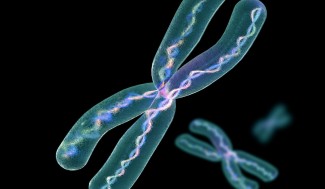Gene therapy could be our best chance of treating Rett syndrome, a neurological disorder that causes severe intellectual and motor impairments. At Paris Brain Institute, Françoise Piguet and her colleagues have looked closely at brain cholesterol metabolism, which is disrupted in young patients. By correcting this pathway through the injection of a gene-drug, the researchers show that, in mice, the symptoms of the disease can be considerably alleviated. Their results are published in the journal Pharmaceutics.
Rett syndrome is a severe disease that appears in early childhood and affects only girls—at a frequency of around one in 10,000 births. In its typical form, the disease is caused by a mutation in a gene that influences the production of MePC2—a protein abundant in the central nervous system which plays an essential role in brain development and maturation.
The syndrome manifests itself in a sudden decline in the child's intellectual and motor abilities after 6 to 16 months of apparently normal development of language, coordination, walking, and social interaction. This interruption in learning is also accompanied by respiratory and cardiovascular problems: multiple disabilities set in within a few months.
Fortunately, adequate medical care allows patients to live for several decades with the disease, which is very heterogeneous: the severity of symptoms depends on the proportion of cells expressing the mutated MePC2 protein.
Cholesterol metabolism, a new therapeutic target
New treatments—such as Trofinetide, reserved for adults and children over two years of age—have recently emerged. However, none can treat all forms of the disease and stop its progression in young patients while their symptoms are still mild.
However, a new line of research is emerging: it seems that the insufficient levels of MePC2 observed in Rett syndrome strongly disrupt the metabolism of brain cholesterol. Cholesterol is a fundamental building block of cell membranes; it contributes to brain development and good communication between neurons and is involved in essential functions—such as learning and memory.
Imbalances in brain cholesterol are observed in several neurological pathologies, such as Huntington's disease or Parkinson's disease. Hence, the idea of exploring this anomaly in Rett syndrome, in which the same kind of disturbances are observed.
Cholesterol cannot freely cross the blood-brain barrier; unlike other organs that use cholesterol produced by the liver or extracted from food, the brain synthesises and regulates the precious lipid in situ. Françoise Piguet's team chose to modulate cholesterol levels directly in the brain by targeting CYP46A1, the enzyme responsible for breaking down cholesterol into a product that can be eliminated from the central nervous system.
Promising success in mice
First, the researchers designed a gene-drug capable of massively increasing the expression of CYP46A1 in the brain and reaching nerve cells using a harmless “adeno-associated virus” (AAV) as a vehicle. Then, they administered the treatment to mouse models of Rett syndrome at a very young age—starting at 21 days—before the onset of symptoms.
The team's results are very encouraging: the treatment significantly increased CYP46A1 expression in the brains and spinal cords of the mice without disturbing the other organs. Once the disease had set in, the symptoms of the treated animals were significantly reduced compared with the controls, and the life expectancy of the males was increased.
Finally, the researchers observed an improvement in the synthesis and degradation cycle of the rodents' brain cholesterol and a correction in the activity of mitochondria—structures essential for proper cell function.
“These data show that regulating brain cholesterol via gene therapy is a promising option for reducing patients' symptoms,” Françoise Piguet adds. “The animals perfectly tolerated the treatment. We will continue to evaluate its efficacy and safety to organise clinical trials as soon as possible. The big challenge will be understanding at what moment in brain maturation this new therapeutic tool should be used. We want to obtain the best possible effects!”
Funding
Cette étude a été financée par la Fondation Lejeune, le programme « Investissements d’avenir », et NeurATRIS, structure de coordination de la recherche translationnelle en neurosciences
Sources
Audouard, E. et al. Modulation of brain cholesterol metabolism through CYP46A1 overexpression for Rett syndrome. Pharmaceutics, June 2024. DOI: doi.org/10.3390/pharmaceutics16060756.







